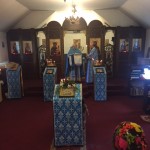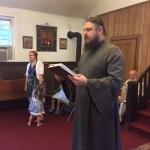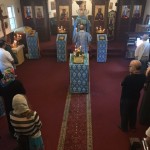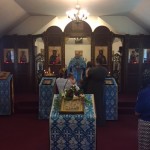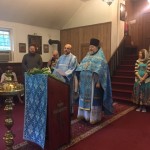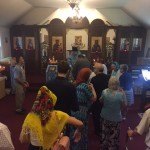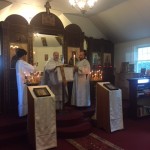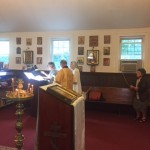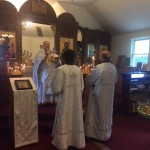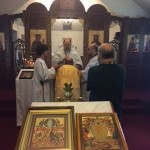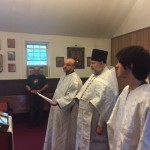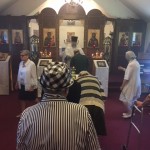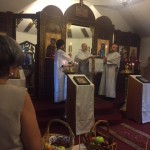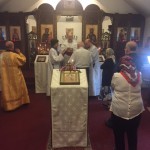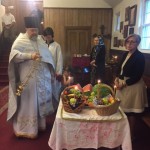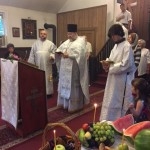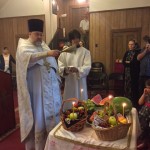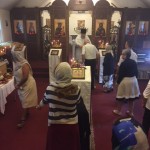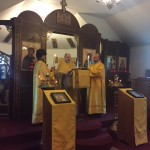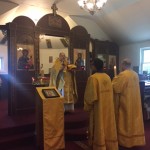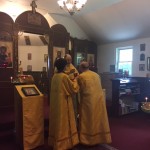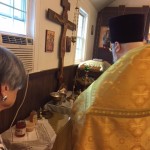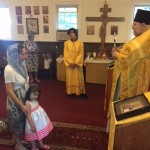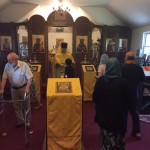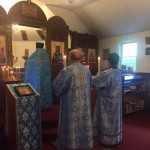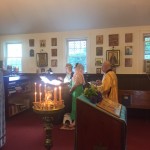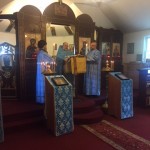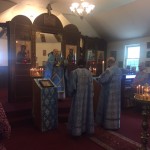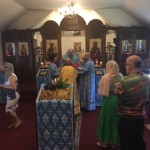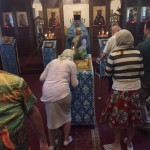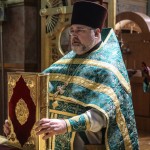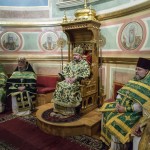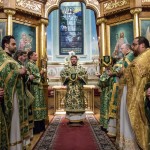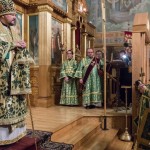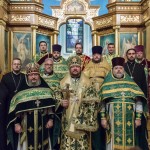On August 28, on the feast of the Dormition of the Most Holy Mother of God we held a nice celebration at St. George Church. Our Rector, Archpriest Igor Tarasov served the Divine Liturgy. Although it was a working day, many people attended the church. Among them was Deacon Matthew Keil, cleric of the Annunciation Church in Flushing, NY who came along with all his family. Fr. Matthew did not serve but performed the reading of the Epistle.
Following the reading from the Holy Gospel the Rector preached a homily in Russian.
The Rector pointed out that Dormition, being the greatest holy day dedicated to the Most Holy Mother of God, is a special event of ending the earthly life of the Theotokos. We do not call it “death” but “falling asleep” because the Blessed Mother had no sin and was not subject to a death of a sinful person. It was rather Her passing from the earth to heaven. It was Her Resurrection which fallowed Her falling asleep because as we believe and as the tradition says, Her body was not found in the grave. It could also be called the Pascha of the Theotokos because Pascha means passing over, and the Mother of God passed over the earthly death and went to the heavenly abode.
The death is something fearsome and sorrowful for a human being. But if we look at the death in the light of Christian faith, we see that it is not dominating over the faithful. Death had a limitless power over men before the coming of Christ. But after the Resurrection of the Lord death became limited in its influence. We still die but if die in Christ, we have a hope of eternal life and our own resurrection. As the Lord said, “I am the resurrection and the life. He who believes in Me, though he may die, he shall live” (Jn. 11, 25). Thus death for a Christian is rather falling asleep, a passing from one kind of being to another.
The Most Holy Mother of God had to finish Her earthly life but for Her it became a passing from the earth to heaven. On the feast of Christ Resurrection we sing: “From death to life, and from the earth to heaven Christ will lead us…” In the same way at Her Dormition the Most Holy Mother of God was led by Christ from death to life, from the earth to heaven.
The more we in our spiritual life become similar to Christ and to His Blessed Mother, the more we are conquering the power of death for ourselves. The more we become sanctified, the less death has an influence on us.
At the conclusion of his homily the Rector called the parishioners to pray to the Most Holy Mother of God that She may bless our pious efforts and lead us from this earthly life to eternal life in heaven.
The choir prayerfully performed hymns dedicated to the Most Holy Mother of God and Her Dormition during preparation for Holy Communion.
Following the dismissal of the Liturgy the Rector and the altar server performed the rite of glorification singing the troparion, kontakion and magnification of the feast before the icon of the Dormition in the middle of the church. Then the Rector congratulated all the faithful on the feast and preached a brief sermon in English.

